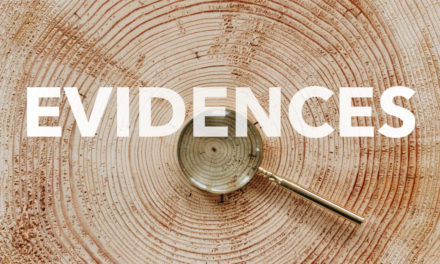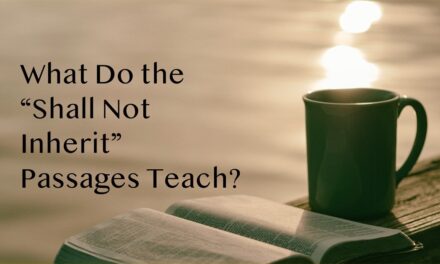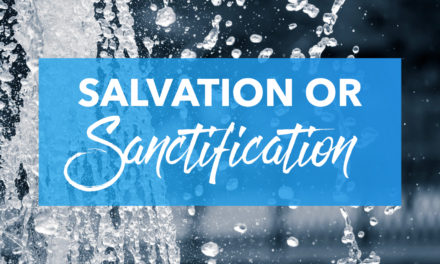Since Matthew 12:1-8 is where Jesus confronted the Pharisees for condemning the innocent, we will investigate more specifically their error in that context.
“At that time Jesus went on the sabbath day through the corn; and his disciples were an hungred, and began to pluck the ears of corn, and to eat. But when the Pharisees saw it, they said unto him, Behold, thy disciples do that which is not lawful to do upon the sabbath day” (vv. 1-2). Was their observation and interpretation correct?
Deuteronomy 23:25 says, “When thou comest into the standing corn of thy neighbour, then thou mayest pluck the ears with thine hand; but thou shalt not move a sickle unto thy neighbour’s standing corn.” The law allowed the disciples actions, but the question is whether this was allowed on the Sabbath. Exodus 20:10 declares, “But the seventh day is the sabbath of the LORD thy God: in it thou shalt not do any work.” Work on the Sabbath is explicitly prohibited, and the Pharisees defined plucking and eating grain as “work.” They defined it as reaping, threshing, and winnowing! It was Pharisaic traditions that formed the basis of their argument, but their traditions missed the point. The Sabbath was for “rest.” It was meant to refresh, and the disciples needed the refreshment of food. In fact, the narrative points out that it was Jesus who led them through the corn (v. 1).
As stated in the first article of this series, Jesus cites Hosea 6:6 and indicates the Pharisees did not understand what it meant. God desires mercy and not sacrifice. The underlying principle is that God cares more about people than rituals. It is important to remember that He is Lord of the Sabbath when considering the next portion of Matthew’s narrative (Matt. 12:9-13). If Jesus cares more about an animal in need than carrying out the discipline of the Sabbath day, then He certainly cares more about people than ritualistic concerns. Beyond this, the Pharisees added their own tradition to the statement of the law, and this caused them to condemn the innocent.
The emphasis of the second article addresses this very point: the danger of going beyond what the Bible says with “your own tradition.” Traditions can be valuable, but taken too far, they inevitably condemn the innocent. That was the main point. Perhaps I should have added more explanation about the “debatable.” Not every matter that is initially debated among those with a heart for biblical authority is a “liberty” issue. Sometimes with a little elbow grease in Bible study, clarity as to the explicit meaning of the text comes into view thus ending the debate. But that is far different than deductions that go several steps beyond an explicit biblical statement. While deductions are fair as we all have to grapple with applying the text, they are not on the same level as explicit authority.
Care must be taken to discern differences between what is explicit, implicit, inference, deduction, and so on. The implicit is one step removed from the explicit. Inference is two steps removed, and so on. Often, the further you get from the explicit increases the risk of contradicting the what is explicit in another passage—as the Pharisees did in our text. Deductions that are several steps removed can lead to flesh-dependent positions because they become dependent on man’s conclusions.
If positions that are several steps removed from Scripture are taken as the authority of Scripture, the authority of the Word itself is weakened by spreading it to man’s conclusions.
Also, if men can decide for all where God Himself is silent, the role of the Holy Spirit is eclipsed for others. If everything is black and white, we don’t need the Holy Spirit. God intentionally did not make everything black and white. If a man makes things black and white where God didn’t, creating a universal application for all, he places himself in the role of the Holy Spirit—a serious error that sets himself up as the object of idolatry.
To be clear, when you embrace “only” where God has been absolute in the written Word, this “rigidity” is freeing since the truth sets free. Anything less would be compromise. And where the Holy Spirit leads you in application, you must obey. But when you add “only” where God has intentionally not been clear, thereby making it universal for all, such rigidity becomes oppressive and burdensome and bondage for others.
It is one thing to urge others to a given position while allowing for the Spirit to lead them. It is quite another matter to couch your conclusion as right and wrong for all. This overreach condemns the innocent.
The point of these articles is simply to not condemn the innocent. This and nothing more. Obviously, this truth is not promoting compromise or Jesus would not have taught it. We need not fear the reality of the truth Jesus taught.

John Van Gelderen
Post Author













Excellent! Thank you so much for continuing to write on this topic. The point about the Holy Spirit is so important! If we really believe in the Holy Spirit we cannot place our personal applications on others. That thought makes things so clear for me.
Thanks Chris. A proper view regarding the Holy Spirit is vital in so many ways.
John you are so good at bringing out a balanced, clear view of things and easy to understand. Thank you. I never heard this passage taught on before.